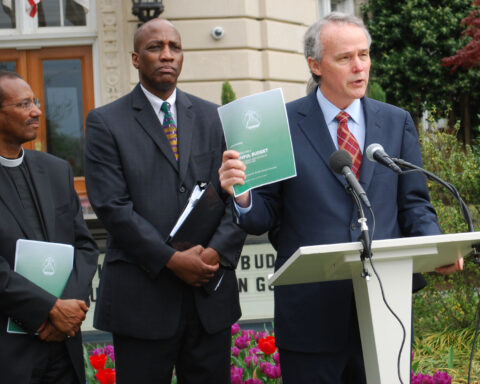[wpcol_1half id=”” class=”” style=””]
Sabbath Economy: A back-up plan
The covenantal economy was vulnerable to the accumulation of wealth in the hands of a few and the creation of hierarchies of power and control. Sabbath regulations made provision for the ways in which luck (good or bad), skill (its absence or abundance), and personal characteristics (positive or negative) separated winners from losers, the rich from the poor, the powerful from the powerless. The weekly Sabbath commands provided a regular reminder of people’s absolute dependence on God and their equality before God. Their survival and flourishing were not simply a result of their own virtue or due to their own hard work, but came as a result of God’s gracious providence. The fourth commandments states:
For six days you shall labour and do all your work. But the seventh day is a sabbath to the Lord your God; you shall not do any work—you, or your son or your daughter, or your male or female slave, or your ox or your donkey, or any of your livestock, or the resident alien in your towns, so that your male and female slave may rest as well as you (Dt. 5:13-14, see also Ex 20:8-9).
The justification for this practice is different in Deuteronomy and Exodus. In Deuteronomy, obedience to this Sabbath practice is based upon the fact that the Israelites had been slaves in Egypt and God liberated them (Dt 5:15). In Exodus, the Sabbath practice is built into the created order—“in six days God created the heavens and the earth…and rested on the seventh day. Therefore the Lord blessed the Sabbath day and consecrated it” (Ex 20:10). But in each case, the commandment has to do with the character and purposes of God. God is the true source of every good thing and therefore everything must be acknowledged as belonging to God and having independent dignity and worth before God.
[/wpcol_1half] [wpcol_1half_end id=”” class=”” style=””]
But the sabbatical commands were not limited to a weekly pattern. They were also embedded into larger patterns of life and economy. Each seventh year was designated as a Sabbath, during which debts would be forgiven, slaves set free, and the land lay fallow (see Ex 23:10-11 and Dt. 15:1-18). The Sabbath year interrupted the slide into inequality and insecurity. Each seventh year all debts were to be forgiven and all slaves were set free. Each seventh seventh year, moreover, was designated as a Jubilee year.
You shall hallow the fiftieth year and you shall proclaim liberty throughout the land to all its inhabitants. It shall be a Jubilee for you; you shall return, every one of you, to your property (nahala) and everyone to your family…In this Year of Jubilee you shall return, every one of you, to your property (nahala) (Lv. 25:10-13).
Sabbath practices not only protected the attitudes at the heart of the covenant economy, but also the structures of dependence, independence, and interdependence that were its foundation. The Sabbatical and Jubilee years were a “proposal for periodic, perpetual land reform such as the world has never seen.”[6] In a society where land was the primary means of economic production, these Sabbath regulations provided structures and practices to resist the reassertion of the hierarchical, imperial economic order that Israel had known in Egypt.
[/wpcol_1half_end]





Unbound Social